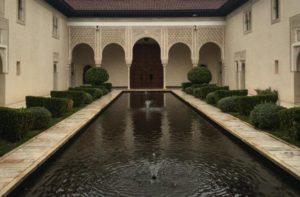Fodor's Expert Review Djemâa el Fna
The open square market at the center of the medina is Marrakesh's heartbeat and a UNESCO World Heritage site. This centuries-old square was once a meeting point for regional farmers and tradesmen, storytellers and healers. Today it's surrounded by bazaars, mosques, and terraced cafés with balcony views over the action. While it’s relatively quiet during the day, food stalls and performers begin to appear in the late afternoon.
Djemâa el Fna comes to life at night when it fills with a variety of performers enticing locals and visitors alike. Gnawa dancers sway clanking their krakebs (castanets) and strumming on traditional guitars while traditional storytellers regale locals with tales from the past. By sunset the square is full, and smoke rises from the makeshift stalls that are set up every evening and offer grilled meats on paper-lined tables.
All day (and night) long you can get fresh orange juice from the green carts that... READ MORE
The open square market at the center of the medina is Marrakesh's heartbeat and a UNESCO World Heritage site. This centuries-old square was once a meeting point for regional farmers and tradesmen, storytellers and healers. Today it's surrounded by bazaars, mosques, and terraced cafés with balcony views over the action. While it’s relatively quiet during the day, food stalls and performers begin to appear in the late afternoon.
Djemâa el Fna comes to life at night when it fills with a variety of performers enticing locals and visitors alike. Gnawa dancers sway clanking their krakebs (castanets) and strumming on traditional guitars while traditional storytellers regale locals with tales from the past. By sunset the square is full, and smoke rises from the makeshift stalls that are set up every evening and offer grilled meats on paper-lined tables.
All day (and night) long you can get fresh orange juice from the green carts that line up around the square, starting at 4 DH a glass. You can also pose for a photograph with one of the roving water sellers (you'll be expected to pay at least 10 DH for the privilege), whose eye-popping costumes carry leather water pouches and polished-brass drinking bowls---we don't recommend drinking from the offered cup of water. Or snack on sweet dates, apricots, bananas, almonds, sugar-coated peanuts, and walnuts from the dried fruit–and–nut stalls in the northwest corner. It’s a festival atmosphere every night of the week!
It's worth noting that while these days this is a wonderful bazaar, once upon a time the Djemâa's purpose was more gruesome: it accommodated public viewings of the severed heads of sinners and criminals. Djemâa actually means "meeting place" and el Fna means "the end" or "death," so as a whole it means something along the lines of "assembly of death" or "meeting place at the end of the world."
Watch out for pickpockets and be wary of ladies here offering henna applications as they're not always aboveboard.
READ LESS



